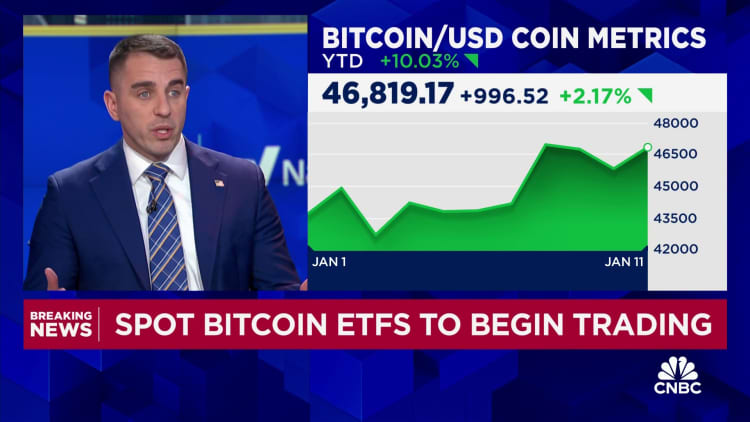
Bitcoin exchange-traded funds saw big swings on their first day of trading on Thursday, mirroring a volatile day for crypto prices more broadly.
The Grayscale Bitcoin Trust (GBTC) closed up 0.5%, well off its highs of the day, while the iShares Bitcoin Trust (IBIT) fell more than 4% after initially rising in morning trading. Both funds saw tens millions of shares traded on Thursday, representing well over $1 billion of trades combined.
Those two were among the first of 11 funds that traded on Thursday after the Securities and Exchange Commission approved rule changes for its exchanges on Wednesday.
The Grayscale fund is the biggest of the group, as it was converted from an over-the-counter trust that already had more than $28 billion in assets. The Hashdex fund is currently a bitcoin futures product, and while a rule change to list the fund as a spot bitcoin product was approved, the fund’s registration statement to convert the fund is still under review with the SEC.
The moves for the funds came as bitcoin saw volatile trading. The digital currency briefly hit the $49,000 mark Thursday morning before falling back below $47,000, for a gain of about 1%, according to Coin Metrics. Bitcoin trades around the clock, so the first-day moves for the funds could be affected by the exact timing of their launch.
ETFs are an investment vehicle where investors buy shares that represent a claim on the fund’s underlying assets. Some of the most popular ETFs are equity index funds, though other funds in the category track bonds, derivatives products and commodities such as gold.
Financial advisors and institutional investors often use ETFs because of their liquidity and tax advantages compared to mutual funds. Asset managers are betting that bitcoin ETFs will bring new investors to crypto.
“This is actually what ETFs were made for — to take difficult, complex things and make it simple and compliant to trade. This will mainstream the asset class,” WisdomTree CEO Jonathan Steinberg said on CNBC’s “Money Movers.”
“This will allow a less technology-sophisticated investor to buy bitcoin in a way that they are very comfortable with,” Steinberg added.
Investors and financial advisors will be watching closely to see not only how the bitcoin ETFs perform, but also how well they track the price of bitcoin. Wide gaps between the price of a fund and the price of the underlying bitcoin that lasts for multiple days could be a sign of thin trading or structural issues with an ETF and scare off potential buyers, even if the fund is temporarily outperforming spot bitcoin.
Trading volume will also be a key metric for investors, as funds with more trading are seen as more efficient, though first-day trading volumes are not always indicative of a fund’s future success.
“We really wanted to see some day one volume, but we also understand that there’s a lot of platforms and gatekeepers and advisors and investors who kind of want to let this breathe a little bit and make sure the fund’s doing what it’s supposed to,” David Mann, head of ETF product and capital markets for Franklin Templeton, told CNBC. The Franklin Bitcoin ETF (EZBC) saw more than 2 million shares change hands on Thursday.
The success of the funds could also be affected by different price points. Several fund issuers cut their proposed fees just below launch, and many are offering temporary waivers that cut their management fee to 0% in the short run.
Don’t miss these stories from CNBC PRO:







